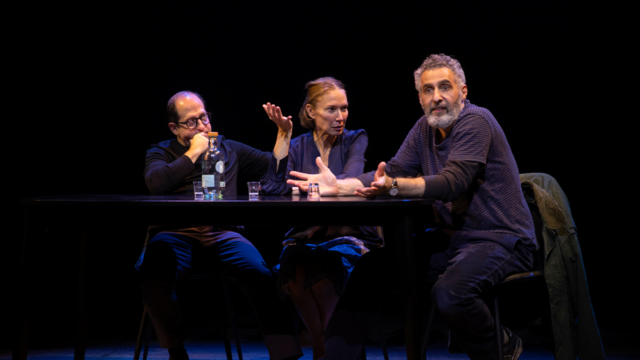
Drenka Balich (Elizabeth Marvel) and Mickey Sabbath (John Turturro) are sexually linked in Sabbath’s Theater (photo by Monique Carboni)
SABBATH’S THEATER
The New Group at the Pershing Square Signature Center
The Romulus Linney Courtyard Theatre
480 West 42nd St. between Tenth & Eleventh Aves.
Tuesday – Sunday through December 17, $32-$112
212-244-7529
thenewgroup.org
www.signaturetheatre.org
John Turturro must have been Jewish in a previous life.
Born in Brooklyn to a mother whose parents were from Italy and a father who emigrated from Italy to America when he was six, Turturro has spent a significant part of his five-decade career portraying Jewish characters, from Bernie “the Shamata Kid” Bernbaum in Miller’s Crossing and Herb Stempel in Quiz Show to Primo Levi in The Truce, Moe Flatbush in Mo’ Better Blues, and writer Barton Fink. He’s also portrayed Egyptian pharaoh Seti I in Exodus: Gods and Kings and Palestinian militant Fatoush “The Phantom” Hakbarah in You Don’t Mess with the Zohan in addition to too many Italians to mention.
So it’s no surprise that Turturro is absolutely exhilarating as Mickey Sabbath in the New Group world premiere of Sabbath’s Theater, which has been extended at the Pershing Square Signature Center through December 17, making it an excellent Hanukkah present.
Turturro and New Yorker writer Ariel Levy adapted the script from Philip Roth’s 1994 novel, which won the National Book Award. Turturro was a good friend of Roth’s; they collaborated on a never-completed one-man show of Roth’s controversial 1969 novel, Portnoy’s Complaint — which lends itself to solo performance — and Turturro portrayed Lionel Bengelsdorf, the misguided, overly trusting rabbi, in the 2020 HBO miniseries The Plot Against America, an alternate history of the rise of antisemitism in America in the early 1940s, based on the 2004 book by Roth.
Mickey is a failed puppeteer — he ran the Indecent Theater — who has had two unsuccessful marriages and has a missing daughter. He’s haunted by the death of his beloved brother, Morty, during WWII and by the ghost of his mother, who seems to hover around him, occasionally whistling, “Don’t Fence Me In.” Mickey is also a sex fiend; the show opens with him making love to the married Drenka Balich (Elizabeth Marvel), the two speaking openly and vividly about copulation. “Coming is an industry with you — you’re a factory,” Mickey says when they’re done. She wants him to be loyal to her, demanding, “I don’t want anyone else. Either forswear fucking others or the affair is over.” He replies sarcastically, “You like monogamy so much with your husband you want it with me, too?”
A moment later they are discussing a potential threesome when, still basking in the glow of sex, Mickey admits to the audience, “I was pierced by the sharpest of longings for my late little mother! I wondered if she had somehow popped out of Drenka’s pussy the moment before I entered it…”
Women are always on Mickey’s mind; his last name, Sabbath, is the Jewish day of rest, which is embodied by a Shabbos Queen, fitting Mickey’s approach to life.

Norman (Jason Kravits) and Michelle (Elizabeth Marvel) try to help their friend Mickey (John Turturro) in world premiere production (photo by Monique Carboni)
Mickey often turns directly to the audience, sharing personal tidbits, deep, dark desires, and explanations for why he is the way he is. He is a man of few morals; he has no respect for Drenka’s husband, Matija (Jason Kravits); his best friends, Norman (Kravits) and Michelle Cowan (Marvel), and their teenage daughter; or his second wife, Roseanna (Marvel), who can’t stand him. “I hated his increasing girth, his drooping scrotum,” Roseanna says about Mickey, adding, “his apish hairy shoulders, his white, stupid, biblical beard.” She then relates how she considered going all Lorena Bobbitt on him. Mickey responds by citing scripture: “She couldn’t have stuck something unpleasant up his ass? A frying pan! A rectum for a rectum. Exodus 21:24.”
When an old acquaintance, Lincoln Gelman, dies by suicide, Mickey starts having thoughts of killing himself too, but he might just love — or at least think he needs — sex too much. Then a visit with his father’s hundred-year-old cousin, Fish (Kravits), sends him careening again back into the past. “Was it good, life? Was it good to live, Fish?” Mickey asks. Fish replies, “Sure, better than being dead.”
Arnulfo Maldonado’s spare set features small pieces of furniture and a handful of props at the far left and right sides that are occasionally brought center stage by the actors or stage crew; Maldonado also designed the costumes, primarily modern-day dress save for a fab white sweater worn by Drenka and an American flag that Mickey wraps himself in. Alex Basco Koch’s projections, Mikaal Sulaiman’s sound, Jeff Croiter’s lighting, and Erik Sanko’s shadow puppet design help define the past from the present.
The story grows bumpier and bumpier in the second half as Mickey, an unreliable narrator, becomes more and more unlikable. But director Jo Bonney (Cost of Living, Fucking A) steers it back just in time before the character completely loses his way.
Turturro (Endgame, The Master Builder) is a powder keg as Mickey, a frenetic, mesmerizing whirlwind you cannot keep your eyes off of; onstage for nearly the full one hundred minutes, Turturro is relentless, relishing his acting job much how Mickey relishes sex. When, during an argument with Roseanna, she yells at him, “You cannot think straight if you’re shouting!” and he fires back, “Wrong! It’s only when I’m shouting that I begin to think straight! Shouting is how a Jew thinks things through!” it’s nearly impossible to believe that Turturro is not Jewish.
Marvel (Julius Caesar, Long Day’s Journey into Night) inhabits her characters so thoroughly that she is nearly unrecognizable as Drenka, Roseanna, Michelle, and cemetery superintendent A. B. Crawford, willing to go toe to toe with Turturro through thick and thin. And Kravits (The Drowsy Chaperone, A Play Is a Poem) sparkles as a series of schleppy men, culminating in his loving portrayal of Fish.
Developed earlier this year by New Jersey Performing Arts Center for “Philip Roth Unbound: Illuminating a Literary Legacy” in honor of what would have been Roth’s ninetieth birthday weekend — the Newark-born writer died in 2018 in Manhattan at the age of eighty-five — Sabbath’s Theater is an uneven but intriguing exploration of sex, love, and death with a heavy dose of filthy Jewish schmaltz.
Mickey might be a wholly indecent man, but underneath it all is a scared little boy. Reflecting on the many losses he’s experienced, he explains, “What’s the point of trying to find reason or meaning? By the time I was twenty-five I already knew there wasn’t any.” But just as Mickey is dishonest with others, he’s also dishonest with himself.
[Mark Rifkin is a Brooklyn-born, Manhattan-based writer and editor; you can follow him on Substack here.]